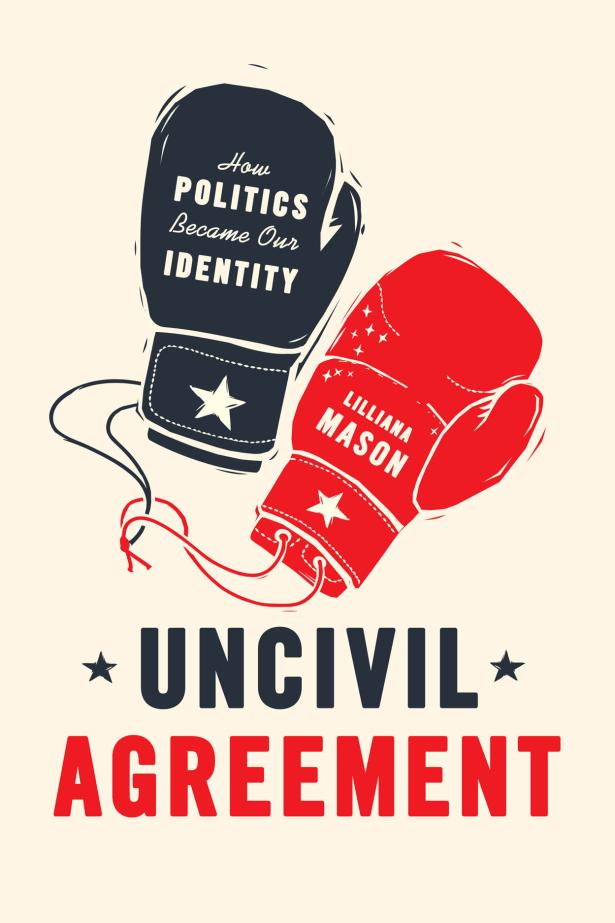Uncivil Agreement
How Politics Became Our Identity
Lilliana Mason
University of Chicago Press
ISBN: 9780226524542
Scholars of social movements have long known that identity is a key factor in mobilization. Taylor and Whittier’s classic 1992 piece and Melucci’s 1989 and 1996 books highlighted the value of the concept for understanding movement action, and it has been theoretically central to the subfield ever since. A number of recent books, however, have demonstrated the usefulness of identity for thinking about politics more broadly. This includes the recent wave of ethnographies focusing on conservatives, such as Hochchild’s Strangers in Their Own Land, Gest’s The New Minority, Braunstein’s Prophets and Patriots, and Burke’s Race, Class, and Gender in the Tea Party, as well as work on voting behavior, like Achen and Bartels’ Democracy for Realists. These books demonstrate the degree to which identity underpins the entirety of our political behavior.
Liliana Mason’s Uncivil Agreement: How Politics Became Our Identity, is a new and compelling entry in our ever-unfolding understanding of identity and politics. …Drawing on voluminous statistical data, Mason’s key argument is that our democracy is threatened by the “stacking” of identities. By this, she means that our identities are increasingly “socially sorted.” Historically, people used to have a variety of “cross-cutting” identities. The average person belonged to many different social groups that may have divergent material and ideological interests. For example, region, class, and ideology did not map neatly onto partisanship at mid-century. Upper-class southerners tended to be Democrats, while upper-class Northerners were Republican.
Similarly, both parties had internal wings that were liberal and conservative. Ultimately, this led to people whose partisanship was mediated by the nuance of their connections to others both inside and outside of their party. A rich Southerner might feel socially connected to other Democrats from the South, while sharing economic interests with Republicans from the North. Put simply, sharing a pew or a street or a board room with people who belonged to a different political party than you mitigated any temptation to venture into the extremes of partisanship.
For a variety of reasons, though, most of which are well documented, the parties “sorted.” The socio-political realignment of the parties after the civil rights movement, increasing geographic segregation of ideologically polarized people, and changes in the religious landscape have all contributed to what Mason calls “mega-identities.” Rather than identities that cut across partisanship, contemporary individuals are more likely to have their identities stacked vertically. Evangelical Christians, rural folk, Southerners, conservatives, and people in the business world are increasingly Republican. Nonwhites, the secular, urbanites, and liberals are increasingly Democrats. This ultimately deepens the ideological, social, and cultural differences between the political parties.
Drawing on Tajfel and Turner’s social identity theory, as well as a bevy of statistical data, Mason shows that this isn’t as simple as people preferring the policies of one party over the other and acting accordingly. Rather, even partisans whose stated policy preferences should align them with the other party still report consistently “warmer” feelings towards their own party by large margins. Additionally, Mason demonstrates people who deeply identify with a party, rather than people who feel particularly strongly about issues, are more likely to engage in partisan activism. Social identity theory, she notes, predicts this. When one identifies strongly with a particular group, an insult to that group is deeply personal. And, as Mason suggests, when one identifies with a number of groups stacked into a “mega-identity,” winning at all costs and humiliating your opponent become profoundly important to one’s sense of self.
In a way, Uncivil Agreement, along with other recent work such as the aforementioned Democracy for Realists and Sides, Vavreck, and Tessler’s Identity Crisis, are the quantitative companion pieces both to the great number of ethnographies on conservatives discussed earlier, as well as to recent books lamenting the disintegration of our political norms, including Mounk’s The People vs. Democracy and Levitsky and Ziblatt’s How Democracies Die. If we take this cluster of work together, we have three key questions that they circle around. First, why has partisanship so dramatically increased in recent decades? Second, what does this look like at the level of lived experience? Third, what are the possible outcomes of these changes for our political system?
Uncivil Agreement can’t answer question two, at least not like the recent ethnographies discussed above can, but it has a great deal to say about questions one and three. Mason deftly shows that social sorting has created a U.S. politics in which partisan victory is preferable to policy enactment, ultimately resulting in the ascendency of a candidate like Donald Trump. She also provides a hard look at the potential negative consequences of a society with partisans so thoroughly sorted. The norms of our democracy, she suggests, require people who are willing to view their opponents as human beings rather than enemies or obstacles. And yet our stacked mega-identities make this increasingly difficult.
Personally, I am often skeptical of the suggestion that cross-partisan cooperation is necessarily good. As Lee’s recent book Insecure Majorities suggests, an era of close competition between parties suggests that refusing to reach across the aisle is wise for people with strong policy preferences, given that they can expect to have control of the engines of government in a few short years. As someone who, personally, has strong policy preferences, I’m not inherently sold on the idea that we should be meeting in the middle. Nonetheless, Mason’s wide-ranging analysis, showing the exhausting preference for victory over policy, the growing extremism of partisans, and the importance of stacked identities for understanding contemporary politics, is one of the most compelling and sobering books I have recently read. If you care about the state of our political system, Mason’s book should absolutely be on your summer reading list.


Spread the word